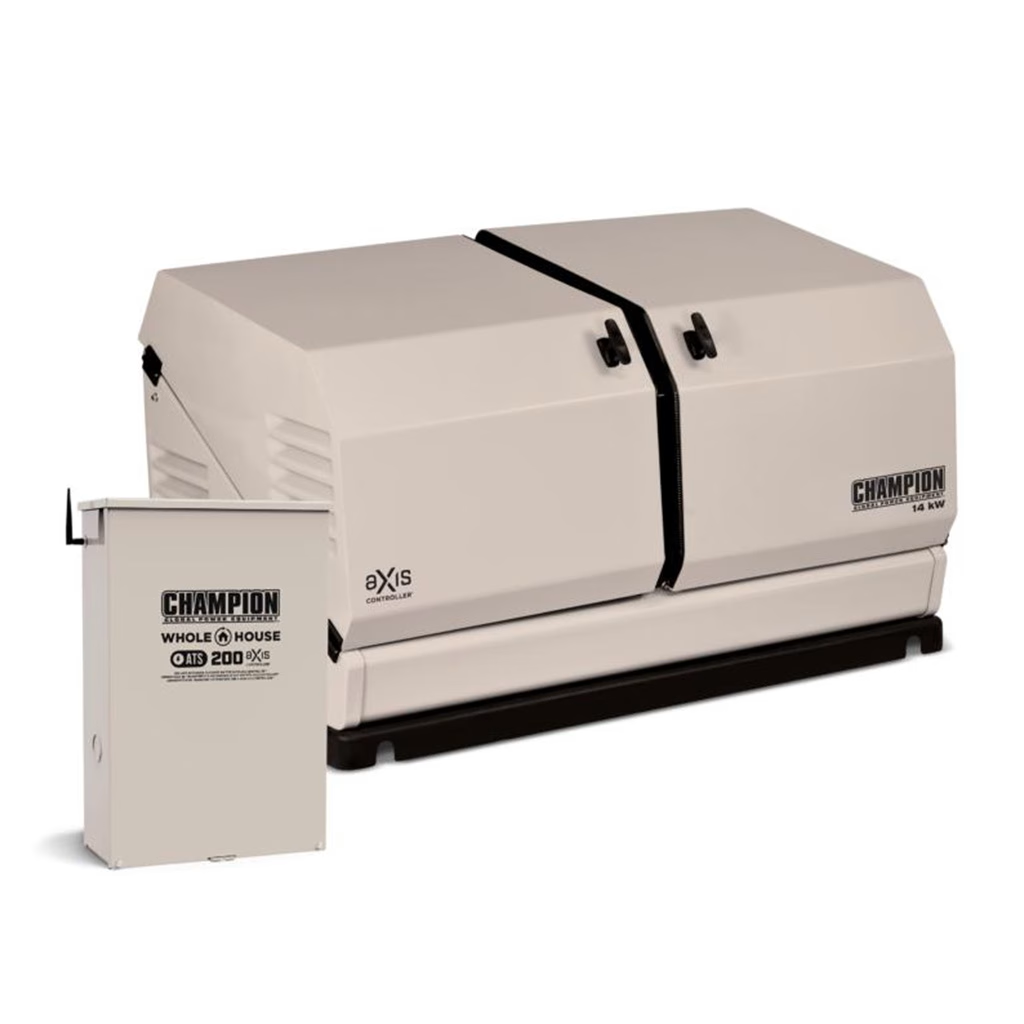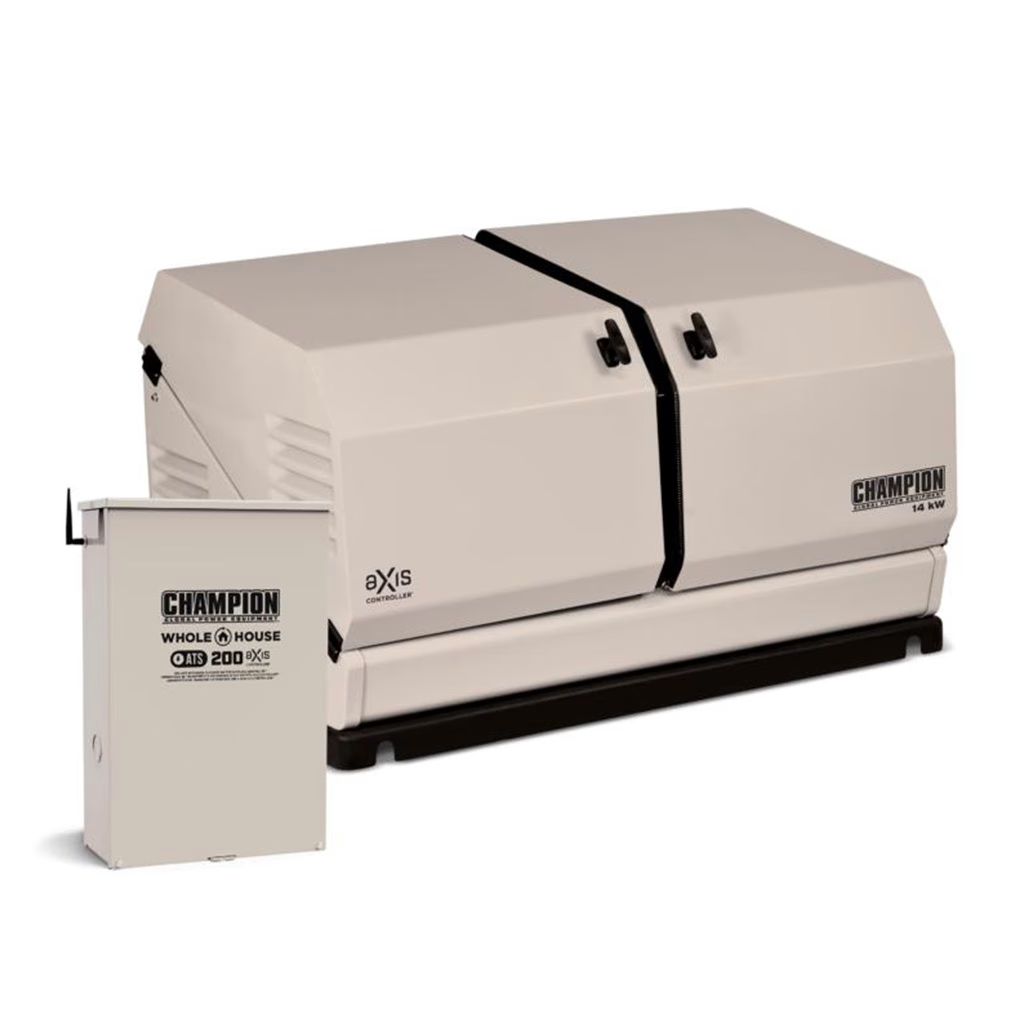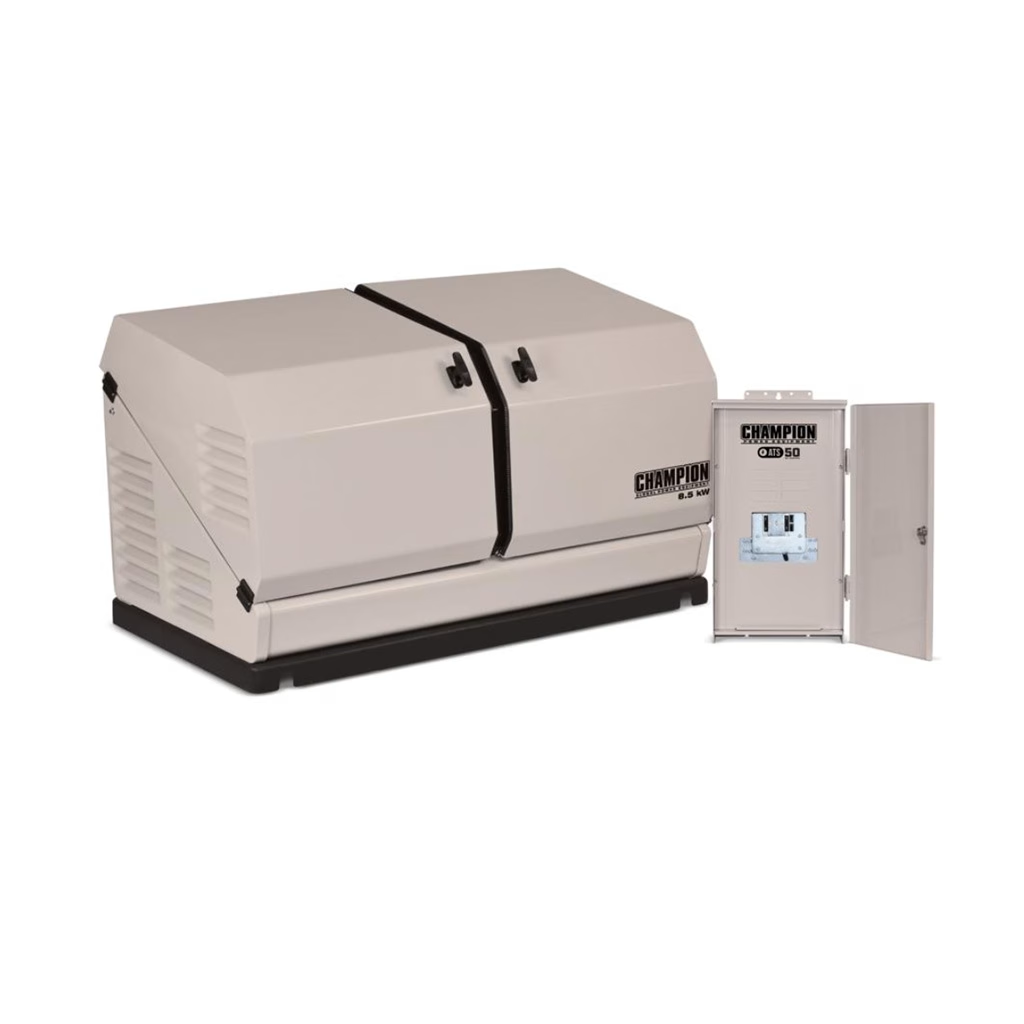Champion Generators have earned a solid reputation in the power solutions industry due to their reliability, efficiency, and affordability. As a trusted name in power generation, Champion has been providing high-quality generators for residential, commercial, and industrial applications for years. At All Electric Inc., we are proud to sell, service, and maintain Champion Generators, ensuring that our customers have access to the best backup power solutions available. Whether you need a portable generator for outdoor activities or a whole-house standby generator, Champion has a model that fits your specific requirements. With an impressive range of options, including dual-fuel technology and inverter generators, Champion provides innovative solutions to meet various power needs. Our team at All Electric Inc. specializes in guiding customers to the best generator choices while ensuring professional installation and maintenance. Investing in a Champion Generator means investing in peace of mind, as these units are built to perform reliably in times of need. Our expertise in servicing Champion Generators ensures that your power source remains in peak condition for years to come. When you choose All Electric Inc. for your generator needs, you receive unmatched expertise and customer support.
Champion Generators stand out in the market due to their combination of durability, power efficiency, and advanced features. One of the primary reasons customers choose Champion is the brand’s commitment to high-quality engineering and affordability. Many Champion models offer dual-fuel capabilities, allowing users to switch between gasoline and propane for greater flexibility in power generation. Additionally, Champion Generators are designed with advanced technology, such as low-oil shutoff, smart economy mode, and remote-start capabilities. These features not only enhance user convenience but also extend the lifespan of the generator. Homeowners and businesses rely on Champion for uninterrupted power during outages, ensuring that essential appliances and equipment remain operational. Champion also offers a variety of inverter generators that provide clean energy, making them ideal for sensitive electronics. Another major advantage of Champion Generators is their industry-leading warranties and exceptional customer service, reinforcing their commitment to customer satisfaction. At All Electric Inc., we highly recommend Champion Generators because of their reliability, ease of use, and overall value. Whether you need a generator for emergency backup power, outdoor use, or job sites, Champion provides dependable solutions for every situation.
Owning a Champion Generator comes with numerous benefits, including peace of mind, cost savings, and improved preparedness. Power outages can strike at any time, disrupting daily life and business operations, but a reliable generator ensures you are never left in the dark. Champion Generators are built for long-term performance, featuring durable components that withstand harsh weather conditions. Many homeowners invest in these generators to maintain household comfort during storms, ensuring that heating, cooling, refrigeration, and communication systems continue to function. For businesses, having a backup generator is critical for preventing lost revenue and protecting essential equipment. Another major benefit is the cost efficiency of Champion Generators, as their fuel-efficient designs help reduce operational costs over time. With user-friendly controls and maintenance features, Champion makes generator ownership simple and hassle-free. Additionally, Champion’s portable generators are perfect for camping, tailgating, and outdoor events, offering convenience wherever power is needed. Whether for emergency preparedness or recreational use, a Champion Generator provides reliable energy whenever and wherever it is required. At All Electric Inc., we help customers choose the perfect Champion model to fit their power needs and budget.
Champion offers a diverse range of generator models, each designed to cater to specific power requirements and applications. Their portable generators are ideal for those who need temporary power solutions for outdoor activities, job sites, or emergency backup. Many portable models come with convenient features such as electric start, wireless remote start, and dual-fuel capability, ensuring flexibility and ease of use. Inverter generators, on the other hand, are perfect for users who require clean, stable power for sensitive electronics, making them ideal for RVs, camping, and tailgating. These models are designed to be quieter and more fuel-efficient, making them an excellent choice for long-term use. For those looking for whole-house backup power, Champion’s home standby generators provide automatic power restoration during outages, ensuring a seamless transition when the grid goes down. Standby models connect directly to your home’s electrical system and operate on propane or natural gas, offering continuous power supply without the need for manual intervention. Each Champion Generator is engineered with durability in mind, featuring heavy-duty steel frames, weather-resistant construction, and long-lasting engines. At All Electric Inc., we help customers identify the best Champion Generator model based on their specific power requirements, ensuring they get the most efficient and cost-effective solution.
When it comes to home backup power, Champion Generators provide unmatched reliability and performance. Homeowners rely on Champion standby generators to keep essential systems running smoothly during unexpected power failures. These generators automatically detect outages and switch on within seconds, ensuring continuous power supply to critical appliances such as refrigerators, HVAC systems, and lighting. Unlike portable generators, which require manual setup, standby generators are permanently installed and connect directly to a home’s electrical panel. Champion’s home standby generators run on natural gas or propane, eliminating the need for frequent refueling and offering long-term efficiency. With various power capacities available, homeowners can choose a unit that meets their household’s energy demands. Advanced features such as automatic voltage regulation, remote monitoring, and noise-reduction technology make Champion standby generators a convenient and dependable choice. Regular maintenance, provided by All Electric Inc., ensures that these generators remain in top condition, ready to perform when needed. Investing in a Champion home backup generator not only enhances comfort and safety but also protects against costly damages caused by prolonged power outages. Our team at All Electric Inc. provides expert installation, maintenance, and support to ensure homeowners get the most out of their Champion Generator.
Proper maintenance is essential to keeping your Champion Generator running efficiently and prolonging its lifespan. At All Electric Inc., we offer comprehensive generator maintenance services to ensure optimal performance and reliability. Routine maintenance tasks include oil changes, spark plug inspections, air filter replacements, and battery checks, all of which contribute to the generator’s longevity. Neglecting maintenance can lead to decreased efficiency, increased fuel consumption, and potential breakdowns during critical moments. Our certified technicians conduct thorough inspections to identify potential issues before they become major problems, preventing costly repairs down the line. Regular servicing also ensures that your generator complies with manufacturer warranty requirements, providing added protection for your investment. In addition to maintenance, we offer emergency repair services to address unexpected malfunctions quickly and efficiently. Whether your generator requires routine servicing or urgent repairs, All Electric Inc. is committed to keeping your Champion Generator in peak condition. By scheduling regular maintenance with our expert team, customers can rest assured that their power supply remains uninterrupted, even in emergency situations. Our goal is to provide long-term support, ensuring that every Champion Generator we service continues to operate flawlessly for years to come.
Choosing All Electric Inc. for your Champion Generator needs means working with a trusted, experienced team dedicated to quality service. Our expertise in selling, installing, and maintaining Champion Generators sets us apart as a leading provider of power solutions. We offer personalized consultations to help customers find the perfect generator model based on their power requirements, budget, and specific applications. Our certified technicians handle professional installations, ensuring that every generator operates safely and efficiently. We also provide ongoing maintenance and repair services, guaranteeing that our customers’ generators remain in top working condition. With our commitment to customer satisfaction, prompt service, and technical excellence, we have built a reputation as a reliable power solutions provider. Additionally, we stay up to date with the latest advancements in generator technology, allowing us to offer expert advice on new features and enhancements. Whether you need a portable generator for outdoor adventures or a whole-house backup system, All Electric Inc. is your go-to source for high-quality Champion Generators. Contact us today to learn more about our products and services, and let us help you secure reliable power for your home or business. With All Electric Inc., you can trust that your Champion Generator will always be ready when you need it most.
Contact us today to learn more about our Champion generator offerings or to schedule a consultation. Let All Electric Inc. be your trusted partner in power solutions, ensuring that you’re never left in the dark.
Our team of highly skilled electricians provide generator sales, installation and maintenance services throughout Ohio and Pennsylvania. We are frequently making service calls Warren, Niles, Girard, Hubbard, Youngstown, Champion Heights, Canfield, Austintown, Boardman, Poland, Struthers, Campbell, Sharon, Hermitage, Farrell, Greenville, Newton Falls, Ravenna, Salem, Alliance, Cortland, Lordstown, Mineral Ridge, Howland Center, and McDonald.
Contact our office today for a free estimate. Our number is (330) 574-8889.



Depend on us for reliable electrical services that keep your systems running smoothly.
Delivering the latest in electrical technology for optimal efficiency and performance.
Prioritizing safety, we adhere to strict standards for secure installations and repairs.
Decades of experience ensure professional solutions for every project.
Welcome to All Electric, your trusted partner for comprehensive electrical services tailored to both residential and commercial settings. Founded on the principles of reliability, precision, and customer satisfaction, our family-owned business has been illuminating communities with top-notch electrical solutions for over a decade.
Under the leadership of Bob Lupton and his son, Robert Lupton, we have built a reputation for excellence, driven by our commitment to delivering state-of-the-art services that meet the evolving needs of our clients.
At All Electric, we specialize in a wide array of electrical services designed to ensure safety, efficiency, and innovation. From modern lighting installations and electrical panel upgrades to complex commercial projects and emergency repairs, our team of certified electricians is equipped with the latest tools and technology to handle your electrical challenges with ease. We pride ourselves on our meticulous attention to detail and our unwavering commitment to safety and customer satisfaction.
Join the All Electric family and experience the difference professionalism and expertise can make in your electrical installations and repairs.